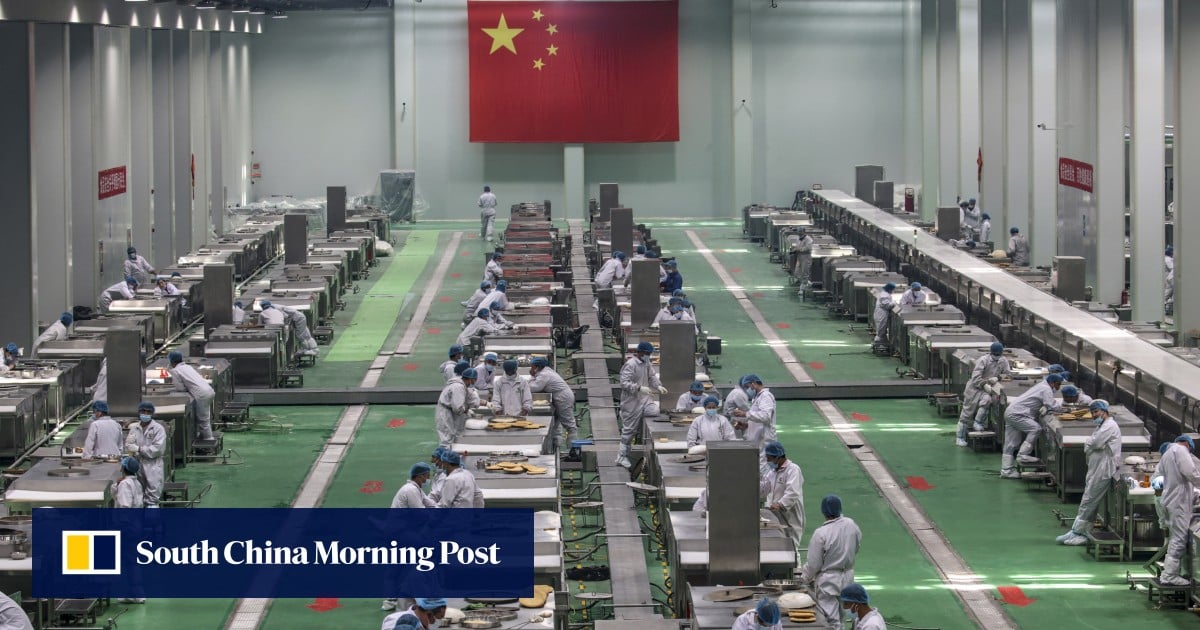Now the legal battle between the Chinese firm and the US government is heating up in part over who shares the burden of proof and the reliability of evidence.
How are Xinjiang goods still reaching the US 2 months into ‘forced labour’ law?
How are Xinjiang goods still reaching the US 2 months into ‘forced labour’ law?
The rapid developments are unfolding amid a “strategic derisking” effort by the US government to cut the world’s second largest economy out of critical supply chains and restrict China’s access to cutting-edge technology by placing dozens of Chinese companies on a separate Commerce Department sanctions list.
Protecting national security from what many officials in the administrations of Trump and current US President Joe Biden have called the “pacing threat” that China presents remains at the forefront of these actions. With human rights at its core, the UFLPA has a somewhat different focus, aiming to ensure that American entities are “not funding forced labour” in China.
Though cumbersome, there are administrative routes available for companies to get themselves removed from both lists. There have been instances of entities being dropped from the Commerce Department list in the past, but it is rare for the UFLPA since supply chains are complex.
Experts say that other sanctioned companies were closely watching the developments in Ninestar’s case, which may have wider implications on how these lists are updated and how the UFLPA is implemented.

Ninestar accuses the Forced Labour Enforcement Task Force, a multi-agency body led by the US Department of Homeland Security, of acting in an “arbitrary and capricious manner in violation of US law”, arguing that the listing decision was taken “without offering any explanation or justification”.
Ninestar contends its listing violated the US Administrative Procedures Act (APA), a federal statute that requires government departments and independent agencies to provide reasons for their decision.
In a December filing, Ninestar claimed that the government’s decision lacked evidence, “applied low standard of proof” and its basis was “retroactive”. The company also requested the court to suspend the implementation of the government’s action against it.
The Department of Justice had argued that the trade court lacked authority to rule on the matter. However, the court found in November that the company would probably win the argument that the case was within its jurisdiction.
Jason Kenner, who leads the litigation team at Sandler, Travis & Rosenberg, a Washington-based law firm that specialises in international trade, called that finding “a signal from the court that it believes that it has jurisdiction to review this matter”.
He cautioned, however, that the government’s motion to dismiss for lack of jurisdiction is still pending.
A hearing scheduled on Ninestar’s request for a preliminary injunction is scheduled for later this month.
Citing Ninestar’s case, Husch Blackwell, another Washington law firm, said in its international trade outlook for 2024 that it expected “challenges regarding the government’s implementation of the UFLPA in the year ahead”.
Since the UFLPA’s enactment, the firm noted, both domestic importers and foreign exporters had “struggled” with a “lack of transparency” in its application.
US demands release of Uygur scholar reportedly given life sentence by China
US demands release of Uygur scholar reportedly given life sentence by China
Customs and Border Protection (CBP) – the Homeland Security agency that administers the law – “typically does not share” the information on which it bases its decision to detain goods, the law firm said.
On Wednesday, the US Justice Department asked the court to dismiss Ninestar’s case and deny its request for temporary relief, arguing that the forced labour task force’s “reasonable cause” standard, was consistent with the UFLPA and akin to standards applied by the Commerce and Treasury departments in their entity lists.
The Justice Department contended that the UFLPA was “directed to foreign relations with China” and designed to strengthen existing prohibitions on the entry of good made with forced labor.
Court filings by the government highlight UFLPA’s “rebuttable presumption” clause that requires enforcement authorities to presume that all goods “mined, produced, or manufactured” in whole or in part in Xinjiang are made with forced labour and prohibited from entering into the US unless proved otherwise. The law also provides no “specific procedural requirement” to add new entities on the list.
“Congress did not specify a particular burden of proof in the UFLPA for the [task force’s] choice to list entities,” the DOJ said in its Wednesday filing, adding that “ultimate burden” was rather on the party claiming that forced labor was not used.
It argued that since it’s “extremely difficult” to obtain reliable information from China or about Chinese individuals and entities due to the country’s strict laws, a “threshold higher than reasonable cause would undermine the effectiveness of the UFLPA”.
The US government also asserted that the decision to blacklist Ninestar was based at least in part on confidential information that cannot be shared with the importer. It argues that the UFLPA does not mandate either the release of evidence or prior notification.
Ninestar, however, maintains that such presumptions create a business environment of “guilty until proven innocent” that “undermines fair competition and choice for American consumers”.
Kenner said that the government’s administrative record filings in the case claim that much of the information is “law-enforcement sensitive”, which can include “personal information of whistle-blowers, and there is always a fear that there could be retaliation against them if their names get out there.
US law to fight forced labour takes effect, banning imports from Xinjiang
US law to fight forced labour takes effect, banning imports from Xinjiang
“Second, by providing law enforcement sensitive information, the government could be concerned that it could tip the government’s hand on how it is collecting information, which would make it easier for wrongdoers to evade our detection,” he said.
But since the APA requires agencies provide an adequate explanation for their actions, “those two arguments are kind of butting heads here,” Kenner said.
Analysts said that a ruling by US Court of Appeals for the Federal Circuit against the CBP in another case last year could have implications for Ninestar.
The court in August had found the CBP had violated due process by taking enforcement action against Royal Brush Manufacturing, a maker of art and beauty brushes, without disclosing the basis for those actions.
The company was alleged to have shipped pencils from China through the Philippines to avoid anti-dumping duties.
“While that case involved a non-UFLPA trade proceeding, the court’s decision raises important questions as to whether CBP is violating importers’ due process rights by making admissibility decisions under the UFLPA without disclosing the basis for those decisions,” Sidley Austin, the law firm representing Ninestar, said at the time.
According to CBP data, the number of shipments that were detained and denied under UFLPA increased more than 50 percent in 2023 from the year earlier. From October 1, 2022, to September 30, 2023, CBP detained more than 4,000 shipments with a combined value of more than US$1.4 billion.
The number of restricted companies on the UFLPA entity list totalled 30 by the end of 2023.
Kenner said that if the court decides that listing Ninestar without giving the company an adequate explanation violated the APA, “customs is going to have to rethink what it shares prior to [a] listing decision”.


